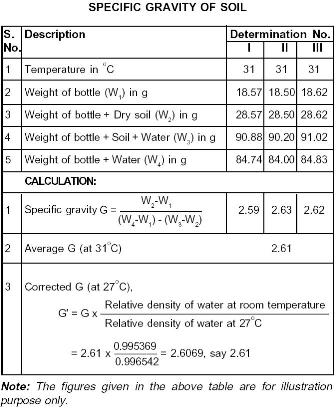This test is done to determine the specific gravity of fine-grained soil by density bottle method as per IS: 2720 (Part III/Sec 1) – 1980. Specific gravity is the ratio of the weight in air of a given volume
of a material at a standard temperature to the weight in air of an equal volume of distilled water at the same stated temperature.
The apparatus used:
i) Two density bottles of approximately 50ml capacity along with stoppers
ii) Constant temperature water bath (27.0 + 0.2oC)
iii) Vacuum desiccator
iv) Oven, capable of maintaining a temperature of 105 to 110oC
v) Weighing balance, with an accuracy of 0.001g
vi) Spatula
PREPARATION OF SAMPLE
The soil sample (50g) should if necessary be ground to pass through a 2mm IS Sieve. A 5 to 10g sub-sample should be obtained by riffling and oven-dried at a temperature of 105 to 110oC.
Procedure to Determine the Specific Gravity of Fine-Grained Soil
i) The density bottle along with the stopper, should be dried at a temperature of 105 to 110oC, cooled in the desiccator and weighed to the nearest 0.001g (W1).
ii) The sub-sample, which had been oven-dried should be transferred to the density bottle directly from the desiccator in which it was cooled. The bottles and contents together with the stopper should be weighed to the nearest 0.001g (W2).
iii) Cover the soil with air-free distilled water from the glass wash bottle and leave for a period of 2 to 3hrs. for soaking. Add water to fill the bottle to about half.
iv) Entrapped air can be removed by heating the density bottle on a water bath or a sand bath.
v) Keep the bottle without the stopper in a vacuum desiccator for about 1 to 2hrs. until there is no further loss of air.
vi) Gently stir the soil in the density bottle with a clean glass rod, carefully wash off the adhering particles from the rod with some drops of distilled water and see that no more soil particles are lost.
vii) Repeat the process till no more air bubbles are observed in the soil-water mixture.
viii) Observe the constant temperature in the bottle and record.
ix) Insert the stopper in the density bottle, wipe and weigh(W3).
x) Now empty the bottle, clean thoroughly and fill the density bottle with distilled water at the same temperature. Insert the stopper in the bottle, wipe dry from the outside and weigh (W4 ).
xi) Take at least two such observations for the same soil.
REPORTING OF RESULTS
The specific gravity G of the soil = (W2 – W1) / [(W4–1)-(W3-W2)]
The specific gravity should be calculated at a temperature of 27oC and reported to the nearest 0.01. If the room temperature is different from 27oC, the following correction should be done:-
G’ = kG
where,
G’ = Corrected specific gravity at 27oC
k = [Relative density of water at room temperature]/ Relative density of water at 27oC.
A sample proforma for the record of the test results is given below. Relative density of water at various temperatures is taken from table here. Relative Density Water

If you have a query, you can ask a question here.



how to find dry density of backfilled soil having debris(10-100mm)
please go to the site where from you took the soil sample… there must be too many insects etc.. ask themm .. they kno everything 😛
why ” distilled water” is used but not “tap water”?
As you know, the distilled water has a density=1 g/ml @ 4 degrees, hence at another temperature or even another conductivity, total hardness…it goes to 1+-0.105
tap water will have some impurity…that is not going to give exact readings…that makes difference in the sp. gravity
yes it have some inpurity so you should have to use distilled water instead of tap water…..
the air is filtered out in distilled water
how to find specific gravity of cement
same as to clayely soil…..very sample…
specific gravity should be taken into consideration by any engineer project suppervision to know the strenth of the material.
how to solve the following qus? a piece of weighting 3 kg in air was found to weight 2.5 when submerged in water . find it is specific gravity?
for wat soil type does G=2.5 correspond ???
In which other type of experiment or what other method can be use to determine the specific gravity of ang given soil sample ?
Good……… thanks
this website is very good for civil engineering students
very useful web site for the civil Engineering students to do their assignments.
Very simpe English and easy to understand.
Superb
Keep it up
why do we use vacuum while determining the specific gravity of soils?
what is the limits of specific gravity of soil
Under which condition, kerosene is used as a liquid instead of distrilled water for specific gravity of soil???
Please answer this question
thank you for the information
what is the type of soil if its specific gravity is 2.61